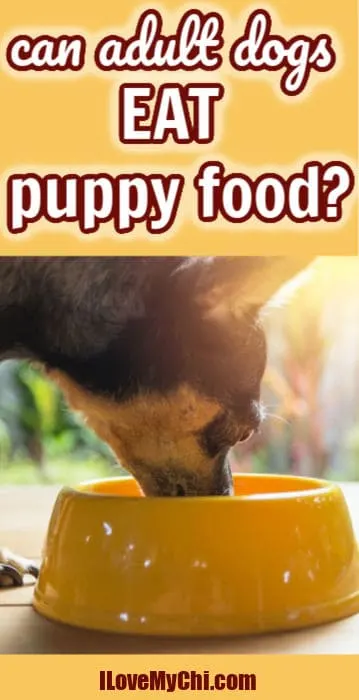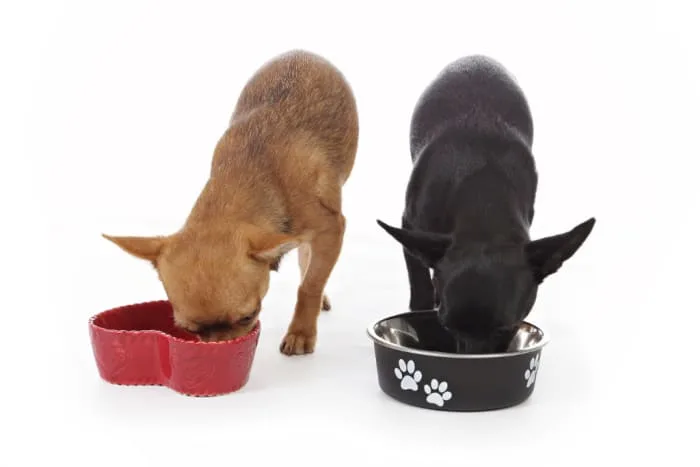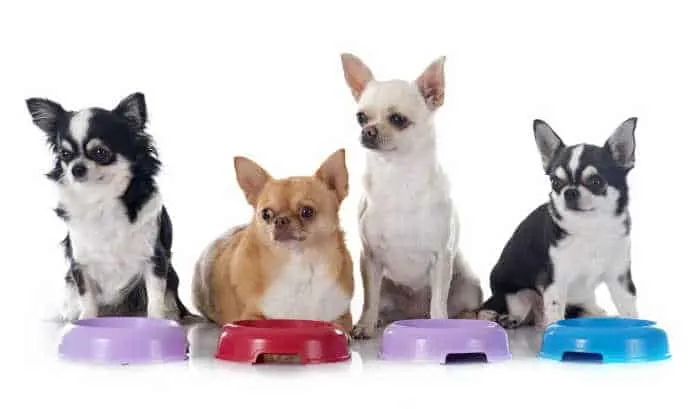
Can Adult Dogs Eat Puppy Food?
Technically they can, but it does not mean that they should. If your adult dog sneaks a snack from your puppy’s bowl occasionally it is no cause for alarm. However, adult dogs should not be exclusively fed puppy food.
Dog food is carefully crafted by veterinarians and nutritionists for each stage of a dog’s life. This means that puppy food is best for puppies (puppies less than 1-year-old), adult food is best for adults (dogs from ages 1 to 7), and senior food is best for seniors (dogs from age 7 and beyond).
The biggest concern with feeding an adult dog puppy food is the extra calories will cause them to become overweight.
Puppy food has extra calories that growing puppies need. As dogs exit puppyhood and enter adulthood, their metabolisms slow down. Further, most dogs are neutered or spayed as they enter adulthood, which is another contributing factor to a decreased metabolism.
Chihuahuas are especially prone to obesity because they are some of the best and sneakiest beggars around, and as a breed, they generally love snuggling and lounging more than exercising.
Helping your furry friend maintain a healthy weight is one of the best ways to contribute to your dog living a healthy and longer life. One way to begin doing this is by feeding a quality food appropriate for your dog’s age.
Some dog food is advertised as “all life stage”, meaning a dog could eat that food their entire life, from puppyhood to their golden senior years. However, as dogs in different stages of life have different nutritional needs, the general conclusion is that your dog’s health would be most benefitted from being served a food created for their life stage, or a homemade diet approved by a veterinarian.
What Should I Feed My Adult Chihuahua?

Your adult Chihuahua will need a healthy quality diet, either a commercially produced dog food or a homemade dog food approved by a veterinarian, to truly thrive.
A healthy and quality commercial adult dog food will have the following qualities:
- Approval from your Chihuahua’s veterinarian.
- Ingredients that you actually understand.
- Real meat, not just meat by-products.
- Healthy carbohydrates.
- Fruits and vegetables.
- Minimal preservatives.
- Minimal recalls as a company.
A healthy homemade diet will have the following qualities:
- Approval from your Chihuahua’s veterinarian.
- Dog-safe meats.
- Dog-safe carbohydrates.
- Dog-safe fruits and vegetables.
- No seasoning or spices.
- A vitamin and mineral supplement such as The Missing Link.
Commercial Diets for Adult Chihuahuas
Based on my personal experience raising my Chihuahuas, my veterinarian’s advice, and feedback from my readers, I have found the best quality commercial diets for adult Chihuahuas to be:
My first choice would be homemade dog food that you subscribe to and have delivered to your door. The ones we have tried and love are:
I know subscription services can be a little pricey and some people would prefer to feed their dogs kibble. Below are the kibble dog food we recommend:
- Wellness Small Breed Adult Complete Health
- Blue Buffalo Small Breed Adult
- Diamond Naturals Small Breed Adult
- Avoderm Small Breed Adult
- Royal Canin Chihuahua Food
Commercial Diet Shopping Tips
The variety of commercial dog food on the market can be overwhelming. Try using these tips to narrow down your search:
- Small breed dog food often has smaller sized kibbles, making them easier for small mouths to chew. However, small breed food is also often higher in calories. If your Chihuahua becomes overweight, you might want to switch to a regular adult dog food, not small breed, to cut out some calories. If the size of the kibble seems a little big for your Chihuahua’s tiny mouth, try soaking the kibbles in warm water for a bit before the meal to soften them, making them easier for a tiny mouth to chew.
- There is an assortment of limited ingredient diets on the market. These limited ingredient diets can be helpful for dogs with allergies or food sensitivities, but do not let switching to a limited ingredient food replace veterinary care and guidance.
- When you shop for commercial diets you will also see special formulas like grain free, which are very trendy right now. Your veterinarian may recommend that your dog eat grain free food and in that event you should follow your veterinarian’s advice, but know that a grain free diet might not be the right choice for your dog. Dogs may eat safe grains as part of a healthy diet, and some dogs do better with grains in their diet than on a grain free diet.
- If you are switching from a lower quality food to higher quality food, keep in mind that your Chihuahua’s serving size will need to be slightly reduced. Higher quality foods have more nutrients and calories in each serving, making it necessary to feed a little bit less at each meal. If you were to continue serving your Chihuahua the same amount of the higher quality food as you did of the lower quality food, he or she could rapidly become a furry little blimp. Monitor your Chihuahua’s figure as you transition foods and adjust the servings up or down as needed. The health of your Chihuahua’s figure will be determined by a body condition score, explained in further detail by VCA Animal Hospital here.
- If you are switching foods, whether from low quality to high quality, or from a high quality to a comparable high quality food, know that you must transition your Chihuahua over about a week to prevent digestive upset. The American Kennel Club details how to transition food in this article.

Home-Made Diets For Adult Chihuahuas
Since dogs have different nutritional needs than we do, feeding a homemade diet is not as simple as sharing a portion of your plate with your Chihuahua. If you would prefer to feed your Chihuahua a homemade diet, know that it should only be done with the assistance of a veterinarian.
While there are many homemade dog food recipes available online, I would advise my readers to exercise extreme caution with these recipes. Many of these recipes are not made with the assistance of a veterinarian and therefore contain ingredients that are not doggy-safe. For owners of Chihuahuas and other small breeds, this is an especially critical area to exercise caution in, because the smaller the dog, the less of a toxin is needed to cause real harm.
The safest route is to go with a book that was formally published and to discuss those recipes with your veterinarian.
Here are some recipe books to discuss with your veterinarian as you plan your Chihuahua’s homemade diet together:
- Real Food For Dogs By Arden Moore
- Dinner PAWsible by Cathy Alinovi and Susan Thixton
- Easy Dog Food Recipes by Scott Shanahan
- Dinner For Dogs By Henrietta Morrison
- Home Cooking For Your Dog by Christine Filardi
- Feed Your Best Friend Better By Rick Woodford
Since commercial diets include vitamins and minerals that dogs need, you will also need to supplement your dog’s homemade diet with these nutrients with the guidance of your veterinarian. A good quality choice to consider is The Missing Link Supplement.
Conclusion
Feeding your Chihuahua a healthy diet is a significant part of keeping him or her healthy. With the guidance of your Chihuahua’s veterinarian, you will be able to select a healthy diet to help your Chihuahua have a good quality of life and a long life.
Do you feed your Chihuahua a commercial diet or a homemade diet? Share your experiences in the comments below.


Penny
Friday 26th of December 2025
We are very fortunate to have one of America's Favorite Veterinarians. Dr. Tim Hunt of Bayshore Veterinary Hospital has developed specific types of dog food for varying breeds. He has been treating our precious Chi's from birth to passing away. I highly recommend trying his dog food, and the Chi's love his freeze dried toppers, so versatile! Rehydrate or add as topper, or reward treat, its an all in one!
Cathy Bendzunas
Friday 26th of December 2025
What's the name of his food?
Valerie Manon
Friday 18th of December 2020
I feed my dogs Fresh Pet for small dogs. They really like it and it has plenty of healthy ingredients.
Cathy
Friday 18th of December 2020
My mom always fed her dog Fresh Pet too. How much do you feed each of them?